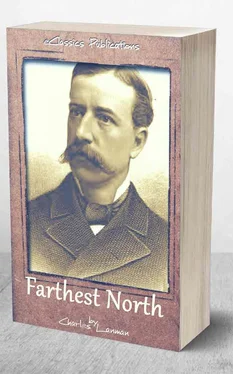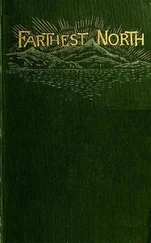Charles Lanman - Farthest North - or, the Life and Explorations of Lieutenant James Booth Lockwood, of the Greely Arctic Expedition
Здесь есть возможность читать онлайн «Charles Lanman - Farthest North - or, the Life and Explorations of Lieutenant James Booth Lockwood, of the Greely Arctic Expedition» — ознакомительный отрывок электронной книги совершенно бесплатно, а после прочтения отрывка купить полную версию. В некоторых случаях можно слушать аудио, скачать через торрент в формате fb2 и присутствует краткое содержание. Жанр: unrecognised, на английском языке. Описание произведения, (предисловие) а так же отзывы посетителей доступны на портале библиотеки ЛибКат.
- Название:Farthest North: or, the Life and Explorations of Lieutenant James Booth Lockwood, of the Greely Arctic Expedition
- Автор:
- Жанр:
- Год:неизвестен
- ISBN:нет данных
- Рейтинг книги:5 / 5. Голосов: 1
-
Избранное:Добавить в избранное
- Отзывы:
-
Ваша оценка:
- 100
- 1
- 2
- 3
- 4
- 5
Farthest North: or, the Life and Explorations of Lieutenant James Booth Lockwood, of the Greely Arctic Expedition: краткое содержание, описание и аннотация
Предлагаем к чтению аннотацию, описание, краткое содержание или предисловие (зависит от того, что написал сам автор книги «Farthest North: or, the Life and Explorations of Lieutenant James Booth Lockwood, of the Greely Arctic Expedition»). Если вы не нашли необходимую информацию о книге — напишите в комментариях, мы постараемся отыскать её.
"Farthest North" by Charles Lanman
Description:
In the 1885 written «Farthest North», Charles Lanman (1819-1895) tells the life story of Lieutenant, and American arctic explorer, James Booth Lockwood, and his deadly participation in the Lady Franklin Bay Expedition, also referred to as the Greely Arctic Expedition.
Farthest North: or, the Life and Explorations of Lieutenant James Booth Lockwood, of the Greely Arctic Expedition — читать онлайн ознакомительный отрывок
Ниже представлен текст книги, разбитый по страницам. Система сохранения места последней прочитанной страницы, позволяет с удобством читать онлайн бесплатно книгу «Farthest North: or, the Life and Explorations of Lieutenant James Booth Lockwood, of the Greely Arctic Expedition», без необходимости каждый раз заново искать на чём Вы остановились. Поставьте закладку, и сможете в любой момент перейти на страницу, на которой закончили чтение.
Интервал:
Закладка:
That the heart of this young man was as pure as his mind was bright, may be seen by reading the following remarks concerning the death of a little niece: “I learn with deep regret the death of poor little Agnes, and sympathize heartily with Lidie and her husband in their affliction, the depth of which none but a parent can know. It should be a consolation, however, that the disease carried the little one away in all the innocence of childhood, before her mother’s love had been intensified with years, and her own intelligence had taught her to love and cling to life. The sad news reached me on the day of the funeral of the little daughter of a brother lieutenant. The little baby seemed very amiable in life, and after death lost none of her sweetness. I sat up with the remains during the night before the funeral.” Alas! when this noble-hearted young man gave up his own life, his only night-watchers were the stars and the icy mountains of the far-distant North!
In December, 1878, the Twenty-third Regiment received orders for service in the Indian Territory, and a few weeks afterward entered upon its line of march. In the mean time, the lieutenant made himself useful in performing the duties of an engineer for the sanitary benefit of the Leavenworth garrison. After some appropriate studying, he soon got the knack of running the levels and measuring angles with the theodolite. He found these new duties interesting, preferring the field-work to the making of the necessary profiles and other drawings, involving measurements to the ¹/₁₀₀₀ of an inch—rather a confining employment.
CHAPTER V. – ARMY-LIFE IN INDIAN TERRITORY AND COLORADO.
From the spring of 1879 until the winter of 1881, Lieutenant Lockwood spent a part of his time in the Indian Territory, but chiefly in the State of Colorado. The first duty of his company was to establish a cantonment on the Canadian River. On their way thither, they made a halt at Fort Supply, where the country was sparsely settled, and where the rolling prairies seemed desolate and interminable. Those of his regiment who had been ordered to Supply, he found in miserable quarters—log-huts covered inside with canvas—old, cold, and forlorn in appearance inside and out, and yet the canvas walls thus used and useless were furnished at a cost of hundreds of dollars. After leaving that place for the Canadian River, he was made the engineer officer, and, with a view of making a map of the route and surrounding country, devoted his time to the science of topography, being rewarded by the hearty approbation of the officer in command.
He had counted upon having some good hunting on this route for turkeys and other game, but was disappointed, owing to the fact, as was supposed, that several hundred Indians had passed through the country some weeks before and had gobbled up everything, including a host of gobblers. On reaching their destination, the company went into camp under a bluff on the Canadian River, where they were to remain until buildings could be erected in the immediate vicinity. At the conclusion of his first letter written home from this camp, he says, “I am lying at full length on a buffalo-robe with my paper on ‘Daniel Deronda,’ and the position is not comfortable.”
In June, Lieutenant Lockwood was sent with a small party to Post Reno, where troubles were apprehended with the Indians. It was not necessary to do any fighting there, however, for the reason that the chief inhabitants of the region were rattlesnakes, tarantulas, and prairie-dogs, and the Indians in the vicinity did not seem to be in a blood-thirsty mood. Returning to the cantonment on the Canadian River, he was depressed by the discomforts of the place—no society and many extra duties—but he, nevertheless, found time and inclination to study the Spanish language, as if determined not to leave a stone unturned in his efforts to make himself useful, or ready for any emergency. After confessing his fondness for social intercourse, he writes: “At times I get the ennui and blues very much. Still I try to preserve a philosophic mind, and when the dark side of the picture presents itself, I take a different stand-point, and thus force myself to see, by contrast, the bright side. I find, and ever have found, that the more occupied I am, the better contented I feel.”
In April, 1880, he went upon a kind of exploring expedition, riding in ten days a distance of nearly three hundred miles, and on returning was glad enough to have a little rest in his camp. But, before he could fall into any idle habits, he was ordered westward, with his command, on still more arduous duties. In a letter from a camp near Saguache, on the borders of Colorado, he sent home the following account of what he had seen and experienced: “We left Fort Garland on the 17th of May, and have since been traveling across ‘San Luis Park,’ the ‘Valley of the Gods.’ This is a vast level plain in southern Colorado, surrounded on all sides by high, snow-capped mountains, which always seem within a few hours’ travel, and yet are miles and miles away. When one considers that Blanco Peak is over fourteen thousand feet above the sea-level, one does not wonder that it is very plainly seen from where I am now writing. This Paradise of the Gods is some two hundred miles long by over sixty across, and is a veritable desert. I have met nothing like it outside of Arizona. The vegetation consists of greasewood and sage-brush—sometimes not even this; the irrigation-ditches that one meets near the few streams seem hardly able to produce a feeble, stunted grass. For miles and miles, all is pulverized dust, which, blown by the winds in blinding clouds, covers everything like the ashes of a volcano. Night before last one of these pleasant zephyrs blew down several of the tents, and filled the air so thickly with dust, that several of the command, who had their hats blown off, were unable to find or recover them. They say it sometimes rains here, but I very much doubt it. The few ranches we have encountered are on streams descending from the mountains, which sink in the plain after running a short distance; and bordering them are the squalid adobe houses, the only habitations in the country.
“Improbable as it may seem, the owners say that they raise potatoes, etc. Surely these mountains should be of gold and silver to compensate for the sterility of the soil.” The prospect did not make Lockwood hilarious, and he frankly said that he was tired of army-life, and that eating almost nothing but bacon, and going without any comforts caused him to sigh for a return to the old Annapolis farm. He had not the ambition to enjoy the glory of army-life in such a wilderness. It might, indeed, give one a competency, but it was a gold-mine in Arizona that had recently given a fortune of fifty thousand dollars to one of the officers of his regiment. After a short stay at Garland and Alamosa, and catching a glimpse of the Del Norte, the command reached the Cochetapa Pass, near Los Pinos and the summit of the Rocky Mountains; and now the lieutenant began to experience a kind of mountain-fever, which he called a weird condition of the system. He was troubled with the shortness of breath usual at great altitudes. The six hundred mules drawing the train of one hundred wagons had great difficulty in passing through what he called the terrible cañons. Early in June, 1880, he reached the Uncompahgre River, where the command encamped. Hardly had he obtained any relaxation before an order came from Fort Leavenworth, detailing a general court and making him the judge advocate, thereby proving that there was not much rest for an officer of recognized ability. While anxious to make money, he did not, while among the mountains, follow the example of certain fellow-officers, who devoted some attention to mining speculations, their mode of operating being as follows: “For example, they secure the services of a competent man, provide him with food, etc., and send him out to prospect. Those in the Nineteenth have received a very flattering letter from their man, who has struck a very rich vein, according to his account. But this and all similar ventures are mere chance. Money, to the amount of twenty-five or fifty dollars, seems little to invest in enterprises that may pay thousands; but these investments count up and are not pleasant to consider when all ends in failure. One of the officers has invested not less than thirty-three hundred dollars in this mine-hunting business. He goes it alone, and has all the enthusiasm of an old miner.” Not caring to waste his money in speculations of this sort, he improved his leisure in exploring the scenery of the region, especially some cañons where the walls were several thousand feet high, and also a stream called Cow Creek, where he had some superb fishing and caught the largest trout he had ever seen, while his companions killed a number of deer. Among the scenes in which he was especially interested was a hot spring which measured thirty feet across, a waterfall two hundred feet high, and a small mining hamlet nestled in a pocket of the mountains, and where, funny to relate, he and his companions were suspected to be tramps or horse-thieves. Returning to his regular cantonment on the Uncompahgre, he was informed of a pending trouble with the Ute Indians, when, according to his habit, he expressed this decided opinion: “If the sentimentalists on Indian questions in the East could be brought out here and made to feel and suffer the outrages which these savages inflict on isolated settlers, there would not be so many to support the Interior Department in its abominable prejudice in all questions of Whites vs. Indians.”
Читать дальшеИнтервал:
Закладка:
Похожие книги на «Farthest North: or, the Life and Explorations of Lieutenant James Booth Lockwood, of the Greely Arctic Expedition»
Представляем Вашему вниманию похожие книги на «Farthest North: or, the Life and Explorations of Lieutenant James Booth Lockwood, of the Greely Arctic Expedition» списком для выбора. Мы отобрали схожую по названию и смыслу литературу в надежде предоставить читателям больше вариантов отыскать новые, интересные, ещё непрочитанные произведения.
Обсуждение, отзывы о книге «Farthest North: or, the Life and Explorations of Lieutenant James Booth Lockwood, of the Greely Arctic Expedition» и просто собственные мнения читателей. Оставьте ваши комментарии, напишите, что Вы думаете о произведении, его смысле или главных героях. Укажите что конкретно понравилось, а что нет, и почему Вы так считаете.












